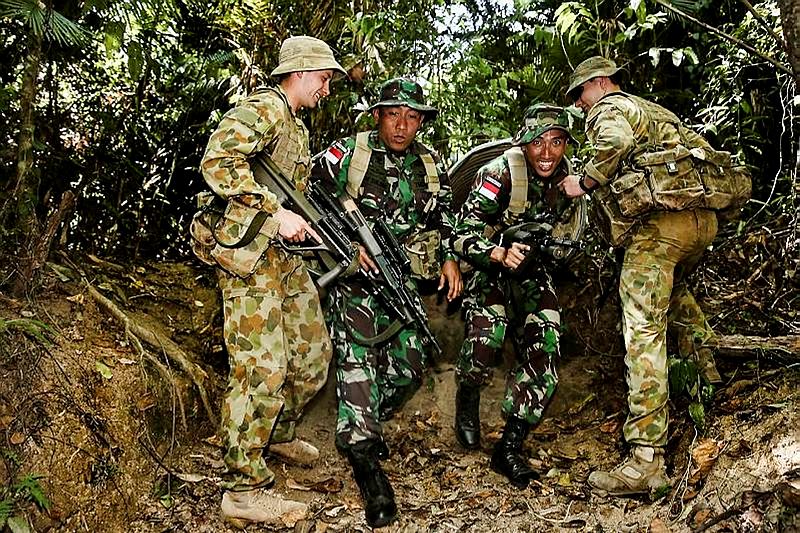
The East Timor crisis presented Australia with a unique opportunity to act like a real regional middle power. For a long time Australia has been a middle power with small power pretensions.
East Timor made Australia step up to the plate and actually lead. For years Australia really didn't want to lead: it simply wanted the problem to go away. There are some important lessons in this for Australia today, because for the 14 years or so since 9/11, with a couple of exceptions—notably the response to terrorist bombings in Indonesia and the Indian Ocean tsunami of 2004—the Australian Defence Force has been distracted by events in the Middle East.
The ADF has made contributions there to defeat terrorism and to support the US alliance. But as we look back and we think about the effectiveness of that strategy, there’s a need for some cool headed introspection. Arguably, while it may have bolstered the alliance, we haven't effectively grappled with terrorism. If anything, the multi-headed Hydra has just reappeared with more heads.
With a new prime minister and a new defence minister, it’s an appropriate time to step back and reconsider our strategic posture in the Middle East and our security engagement in Southeast Asia and the Southwest Pacific.
As good international citizens, there’s nothing to be gained by precipitously withdrawing our forces from Iraq and Afghanistan. But the commitments to these two countries need to be considered separately.
Our commitment in Afghanistan should be seen in a different category. Australia has been engaged there since the outset. There’s a strong case to be made that Australia has a moral obligation to see that through, to support a democratically elected government that’s precariously placed and buffeted by dark opposing forces. Plenty of criticism can be levelled at the state of affairs in Afghanistan but there is still considerable hope for Afghanistan. We shouldn’t walk away from that.
In Iraq however, it’s a different equation. We are really fiddling round the edges. Despite the best efforts of true professionals in the ADF we aren’t making a substantive difference on the ground. All the indicators suggest that in a few years’ time there will be not much to show for what we're doing now.
As we take stock, we need to remember the two things we’re there for: the alliance and defeating terrorism.
The best thing we can do for the alliance is to focus on our neighbourhood and bolster security and stability in Southeast Asia and the Pacific. That's where we value-add for the alliance and to our own national security.
In terms of terrorism, what we're doing in Iraq and Syria is simply poking the hornet's nest. We're far better dealing with terrorism in our patch: developing the relationships, expertise and cultural understanding to nip that threat to our neighbourhood in the bud. There are enough security challenges in Southeast Asia to more than occupy our defence and security institutions for many years to come.
The most important relationship of enduring consequence for Australia is with Indonesia. We need to get that right. We need to treat it with kid gloves. We need to treat Indonesia with respect. We need to treat Indonesia as a security partner, and we need to foster that partnership. That’s already happening up to a point. But a much sharper focus needs to be directed on managing that relationship in a sustainable and constructive manner.
Beyond that, there are a whole range of traditional and non-traditional security concerns that affect both Indonesia and Australia and the neighbourhood. There are also conventional ones beyond: the developments in the South China Sea over the last year or so have worried all of the countries in Southeast Asia.
That's where we need to be investing our energies and we're pretty light on in that department at the moment. The arrival of the new landing helicopter dock ships is potentially a
game changer in the Pacific. We should be looking creatively to employ these vessels to be bridge builders—literally and metaphorically—with our neighbours in Papa New Guinea, Timor Leste, Indonesia and beyond.
Beyond that, Australia’s long involvement with the Five Power Defence Arrangements has been of invaluable benefit. We need to find a way to include Indonesia in a similar way. ‘Manis’, in Bahasa, means sweet. To sweeten regional ties we need to include the MANIS countries, Malaysia, Australia, New Zealand, Indonesia and Singapore in a regional security forum where traditional and non-traditional security concerns can be discussed and regional solutions explored. The time has come for us to channel the creative energies of our best and brightest into the growing challenges confronting our immediate neighbours. Our neighbourhood could use our undivided attention.
 Print This Post
Print This Post